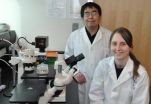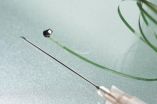(Press-News.org) Children express the stereotype that mathematics is for boys, not for girls, as early as second grade, according to a new study by University of Washington researchers. And the children applied the stereotype to themselves: boys identified themselves with math whereas girls did not.
The "math is for boys" stereotype has been used as part of the explanation for why so few women pursue science, mathematics and engineering careers. The cultural stereotype may nudge girls to think that "math is not for me," which can affect what activities they engage in and their career aspirations.
The new study, published in the March/April issue of Child Development, suggests that, for girls, lack of interest in mathematics may come from culturally-communicated messages about math being more appropriate for boys than for girls, the researchers said.
But the stereotype that girls don't do math was odd to lead author Dario Cvencek, who was born and raised in the former Yugoslavia. "We didn't have that stereotype where I grew up," said Cvencek, a postdoctoral fellow at the UW Institute for Learning & Brain Sciences. "People there thought that math went with girls just as much as it did with boys."
Cvencek and his co-authors wanted to examine whether American children have adopted the cultural stereotype that math is for boys during elementary-school years, and if so, whether they apply that stereotype to themselves.
Math self-concept – how much youngsters identify themselves with math, as in "math is for me" – has been left out of previous studies of the math-gender stereotype. Even though other studies using self-report measures show that boys and girls alike make the "math is for boys" linkage, the studies don't distinguish between whether girls simply know about the math-gender stereotype but aren't fazed by it, or are instead applying it to themselves so that it affects their identity, interests and actions.
The researchers used a computer-based categorization test, the Implicit Association Test, to assess how school children link math with gender. In adults, the test can predict actual math performance and real-world choices.
The adult test, developed by UW psychology professor Anthony Greenwald, also a co-author of the research, probes implicit self-concepts, stereotypes and attitudes. It captures stereotypes by measuring, for example, how strongly respondents associate various academic subjects with either masculine or feminine connotations. The stronger the stereotype is, the faster the response.
The UW researchers adapted the adult Implicit Association Test for children and used it to examine three concepts:
- Gender identity, or the association of "me" with male or female.
- Math-gender stereotype, or the association of math with male or female.
- Math self-concept, or the association of "me" with math or reading.
The kids, 247 children (126 girls and 121 boys) in grades one through five in Seattle-area schools, sat in front of a large-screen laptop computer and used an adapted keyboard to sort words into categories.
In the math-gender stereotype test, for example, children sorted four kinds of words: boy names, girl names, math words and reading words. Children expressing the math-gender stereotype should be faster to sort words when boy names are paired with math words and girl names are paired with reading words. Similarly, they should be slower to respond when math words are paired with girl names and reading words are paired with boy names.
As early as second grade, the children demonstrated the American cultural stereotype for math: boys associated math with their own gender while girls associated math with boys. In the self-concept test, boys identified themselves with math more than girls did.
The researchers also used self-report tests and on all three concepts found similar responses to the Implicit Association Test.
"Our results show that cultural stereotypes about math are absorbed strikingly early in development, prior to ages at which there are gender differences in math achievement," said co-author Andrew Meltzoff, a UW psychology professor and co-director of the UW Institute for Learning & Brain Sciences. Meltzoff holds the Job and Gertrud Tamaki Endowed Chair at UW.
Parental and educational practices aimed at enhancing girls' self-concepts for math might be beneficial as early as elementary school, when the youngsters are already beginning to develop ideas about who does math, the researchers said.
"Children have their antennae up and are assimilating the stereotypes exhibited by parents, educators, peers, games and the media," Meltzoff said. "Perhaps if we can depict math as being equally for boys and girls, we can help broaden the interests and aspirations of all our children."
###
The research was funded by a National Science Foundation grant to the LIFE Science of Learning Center.
For more information, contact Meltzoff at 206-685-2045 or meltzoff@uw.edu, Cvencek at 206-543-8029 or dario1@uw.edu, and Greenwald at 206-543-7227 or agg@uw.edu.
UW Institute for Learning & Brain Sciences: http://ilabs.washington.edu/
To learn more about expanding participation in math and science, read a National Academies report: http://www.nap.edu/catalog.php?record_id=12999#description
END
Scientists from Monash University have uncovered a new understanding of how male puberty begins.
The key to their findings lies with a protein known as SMAD3 and the rate at which it is produced.
Researchers, Associate Professor Kate Loveland and Dr Catherine Itman from the Faculty of Medicine, Nursing and Health Sciences have discovered through laboratory testing that half as much SMAD3 protein results in faster maturation than the norm, and an inability to create SMAD3 results in abnormal responses to testosterone.
"SMAD3 is a protein that translates signals from ...
Alum is an adjuvant (immune booster) used in many common vaccines, and Canadian researchers have now discovered how it works. The research by scientists from the University of Calgary's Faculty of Medicine is published in the March 13 online edition of Nature Medicine. The new findings will help the medical community produce more effective vaccines and may open the doors for creating new vaccines for diseases such as HIV or tuberculosis.
"Understanding alum properties will help other vaccines because we are one step deeper into the mechanistic insight of adjuvants, ...
Research into how the brain transmits messages to other parts of the body could improve understanding of disorders such as epilepsy, dementia, multiple sclerosis and stroke.
Scientists at the University of Edinburgh have identified a protein crucial for maintaining the health and function of the segment of nerve fibres that controls transmission of messages within the brain.
The study, published in the journal Neuron, could help direct research into neurodegenerative disorders, in which electrical impulses from the brain are disrupted. This can lead to inability to ...
Research commissioned by Cerebra, the charity that helps to improve the lives of children with brain conditions, and carried out by the Cerebra Research Unit (CRU) at the Peninsula College of Medicine & Dentistry, has found little evidence to suggest that cranial osteopathy is of benefit to children with cerebral palsy.
The research is published on-line in the Archives of Disease in Childhood.
Osteopathy has, over recent years, become a popular complementary treatment for children with cerebral palsy. Cerebra initially asked researchers at the CRU to investigate existing ...
The first major study of the wellbeing and inclusion of former politically motivated prisoners in Northern Ireland will be launched by Queen's University today (Monday 14 March).
Ageing and Social Exclusion among Former Politically Motivated Prisoners in Northern Ireland and the border region of Ireland investigated the well being and social and economic inclusion of loyalist and republican former prisoners (aged 50 and over) as older people in Northern Ireland. The report will be launched at Parliament Buildings at Stormont this afternoon.
The research was led by ...
International climate negotiations are deadlocked between the affluent global North and "developing" South, between political Left and Right, and between believers and deniers. Now, authors writing in the latest issue of the International Journal of Water argue that a more integrative analysis of climate should help resolve these conflicts.
Land use changes and water management are highly relevant to climate change. To quote hydrologists Juraj Kohutiar and Michal Kravcik of the Slovak People and Water NGO: "Water evaporation is the most important agent of energy transformation ...
Potsdam/Bremerhaven, March 14th, 2011. Unusually low temperatures in the Arctic ozone layer have recently initiated massive ozone depletion. The Arctic appears to be heading for a record loss of this trace gas that protects the Earth's surface against ultraviolet radiation from the sun. This result has been found by measurements carried out by an international network of over 30 ozone sounding stations spread all over the Arctic and Subarctic and coordinated by the Potsdam Research Unit of the Alfred Wegener Institute for Polar and Marine Research in the Helmholtz Association ...
Calling it the "new periodic table for flies," researchers at North Carolina State University and collaborators across the globe have mapped the evolutionary history of flies, providing a framework for further comparative studies on the insects that comprise more than 10 percent of all life on Earth.
The research, published today in the online edition of Proceedings of the National Academy of Sciences, plugs gaps in the 260-million-year history of the fly order Diptera, says Dr. Brian Wiegmann, NC State professor of entomology and primary investigator of the fly tree ...
Electric cars are the future – a view shared by government and the automotive industry alike. The German federal government aims to establish Germany as the lead market for electromobility. By 2020, a million passenger cars with an electric drive should be on the roads in Germany. The prospects of achieving that aim look good: As the ADAC, the German motoring organization, found out in a survey, 74 percent of those surveyed would buy an electric car if they did not have to compromise in terms of cost, comfort and safety. Consumers are not willing to compromise one iota ...
Endoscopy has gone through amazing advancements in recent years. Microcameras on the tip of endoscopes supply images from the inside of the human body in ever higher resolution, which often makes it possible to identify tumors at an early stage. Endoscopes to date have some downsides, since they are expensive and, because of their multiple usages, have to be put through time-consuming and exhaustive cleaning procedures every time they are used. This problem might be solved by a new microcamera that the Fraunhofer Institute for Reliability and Microintegration (IZM) in Berlin, ...


